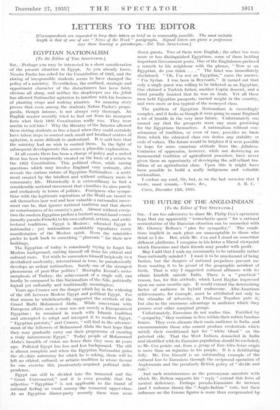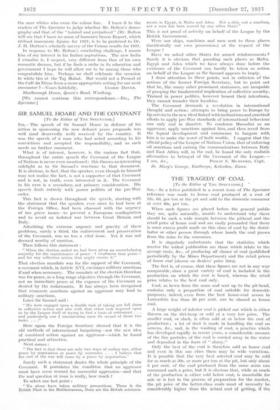THE FUTURE OF THE ANGLO - INDIAN, [To the Editor of TILE
SPECTATOR.]
am too subversive to share Mr. Philip' Cox's optimistic' hope that my apparently "iconoclastic quest " for a rational' reorientation of the Eurasian situation can be reconciled with- Mr. Glorney Bolton's " plea for sympathy." 'The condi- tions implicit in such pleas are unacceptable to those who think as I do. But, while Mr. Cox and I stand on somewhat different platforms, I recognise in his letter a liberal viewpoint' which Eurasians and their friends may ponder with profit. •
May I add that I wish my community to be rationally rather than nationally minded ? I want it to be unashamed of being Indian, but the dangers of national prejudices prevent me from wanting it to be proud of the geographic accident of birth. That is why I suggested cultural alliances with its ethnic kinsfolk outside India. There is a "practical " reason, too, for this attitude, which Lord Raglan impressed upon me some months ago. It would extend the determining factor of audience in hybrid endeavour. ' Afro-American. achievements, for example, must be attributed not only to, the stimulus of adversity, as Professor Toynbee puts it,' but also to the enormous advantage in audience which they possess over other marginal groups.
Unfortunately, Eurasians do not realise this. Fortified by " sympathy," they continue to live within their rotten bamboo fences. They even alienate their main audience in India, and. excommunicate those who cannot produce credentials which satisfy their conditioned lust for"white blood" on the paternal side. That the West Indians domiciled in India and identified with its Eurasian population should be excluded, as Mr. Cox points out, from a group of Eur-Afro-Asian origin is more than an injustice. to his people. It is a debilitating folly. Mr. Cox himself is an outstanding example of the cultural loss to Eurasians through the reciprocal operation of Anglomania and the peculiarly British policy of "divide and rule." • • - . .
And such reminiscences as the patronymic anecdote with which Mr. Bolton supports .his " reply" extend this form of mental deficiency. Perhaps pseudo-Eurasians do increase (and I welcome them) .the " Anglo-Indian " vote, but their influence on -the Census figures' is more than compensated by-
the near whites who cross the colour line. I leave it to the readers of The Spectator to judge whether Mr. Bolton's demo- graphy and that of the "tainted and prejudiced" (Mr. Bolton will see that I have no sense of humour) Simon Report, which utilised inaccurate figures for 1921, is to be preferred to Dr. J. H. Hutton's scholarly survey of the Census results for 1931.
In response to Mr. Bolton's concluding challenge, I assure him of my interest in his Indian aspirations. The new India
visualise is, I suspect, very different from that of his own romantic dreams, but if he finds a niche in its education and government I hope he will allow me to be among those who congratulate him. Perhaps we shall celebrate the occasion in white ties at the Ta,j Mahal. But would not a Pernod at the Café du Dome form a more appropriate setting for our next [We cannot continue this correspondence.—En., The Spectator.]



































 Previous page
Previous page